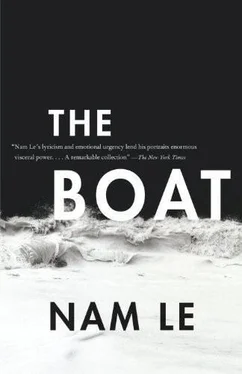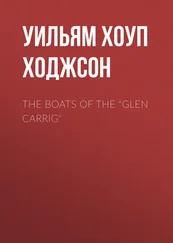"Alison!" he called out.
The cry passed his mouth and coursed back into his body. Tons and tons of water moving under you. She stopped. Her body was slim and pale, a trick of light, against the black rocks.
"How's it different?" he said.
"What?"
"How's it different with me?" he shouted.
She stood in the half dark, then shrugged. When her shoulders didn't stop shrugging he realized she was crying. Jesus. He got up and scrambled toward her.
"All that time — you don't know what it's like for me all that time," she said. Her voice sounded older. She lifted her head and searched toward him with her open face. "He likes to hold my hand when he's drunk," she said. Even over the wind he could hear the bitterness. "The rest of the time — you look and you look and there's nothing there. Fucking zilch. With you, it's different."
"Okay."
"It just is."
"Okay."
"I'm sorry." He watched as she stood there, hugging her ribs. You couldn't turn back from something like this. You saw it through and it ruined you.
"Don't go," he said.
***
WHEN HE WAS LITTLE he used to follow his dad down to the wharf. Watched him cast off the hawser, chug out ahead a rimy trail of grease bubbles, the chorus of curses from the wharfies. In time Jamie was allowed, on school holidays, to come along. But usually his dad would be gone by breakfast and it never felt like a missing — more like he brought the sea into their house and it braced the rest of them to know where he was, what it looked like where he was, the sea around him. Before Michael was born, before his mum's sickness. Best was when they went out in the little runabout with the two-stroke, him and his dad, and sometimes his mum as well-she'd be cradling a basket of barbecued chicken and some beetroots, sitting on rolls of butcher's paper as long as her legs — and he'd dip his fingers behind the stern and draw a white gully into the darker water.
Then Michael. When he was old enough they took him along and together they explored the whole bight of the bay. They fished for King George whiting off the southern promontory and snapper and trevally in the deeper waters. His great-grandfather had skippered one of the first trawlers in HalfleadBay: back then he could go out for six weeks over Christmas, dip in, and make enough money to fish for sport the rest of the year. Jamie loved it-the idea of his family having worked that body of water for generations. He caught his first fish when he was six — a mako — he'd never forget its spearlike snout, the long cobalt gleam of its back. His dad's hands cupping his on the reel. They gaffed it twice, behind the gills, and even when its tail flayed his arm he could barely hold in the rapture. Gulping down his dad's praise — Not a bad effort , he kept saying. Not a bad effort, a shark your very first time .
His last time, though. Over five years ago. Early evening: no luck — nothing — they'd only stayed to make it worth the long hike. The rock pier was a tricky spot: you couldn't moor a boat and it was on the undeveloped side of the dunes. No tourists out there. The nearest road was an hour off — you had to cart all your gear along the headland. They'd been about to leave when Jamie's rod bowed forward.
He grabbed it, hauled back until the rod made a tight arc.
"What is it?" asked his dad.
The resistance was strong but even."Snagged, I think."
Michael looked back down, continued packing the tackle away. Jamie reeled in his line. It was getting dark, the sea glass-colored. The tide was coming in fast, too, washing higher against the rocks and leaving a frothy train. His mum, foraging through the lower rock pools, planted her feet — freezing her posture — every time the water surged in, and it seemed to Jamie like a private game.
"Okay," said his dad. "Pull her in and let's go."
Jamie continued reeling in. Then his line jerked hard. He leaned the rod back again-probably the reef, or a bed of sea grass — but then he felt it, there, and there — the unmistakable give and drag of a fish.
"Got one," he cried out.
"You sure?" His dad observed the weight on the line and climbed to his feet.
"Got one," Jamie repeated.
It was fighting now, weaving and twisting. The line went slack. When the charge came he was pulled forward and almost lost his footing. He looked down: browny yellow lichen. Spume churning over his ankles.
His dad grinned. "Set the drag," he said. Jamie set the drag.
They watched over the gray water together. Too dark to see anything. He fought the fish, tracking its every tension, tugging and reeling, imagining its flight through spindling reefs and sand and meadows of sea grass. This was it — this was why you waited. His dad next to him, fired up, talking him through it.
The line went spastic. It convulsed in short bursts. Jamie gripped the rod with excitement — he'd never felt a fish do this before. He glanced at his dad, who was squinting out to sea. Michael and his mum too. The sea was like this. You could wait all day and then, just when you were leaving, it might offer something up — the rubbery back of a whale, the glass-sharp glint of jumping mackerel — something. You wouldn't even know you were waiting till it came and you missed it. In the distance, something disrupted the surface of the glazed water — it was beautiful — beautiful to think it connected to him.
He tugged, reeled, tugged. His mum said, "Oh my God." He couldn't make anything out in the grayness. When she said it the second time he saw it. Wings beating furiously. A seagull. Then he heard the high-pitched screeching. It sounded human, the intonations of a baby girl throwing a tantrum. He continued reeling, the rod stooping lower and lower as he dragged the bird across the water, through the chop and, at last, to the rocks. Now it was quiet.
"Oh my God."
His dad said, "Where's it hooked?"
It had stopped moving. Jamie tried to lift the line but its body was wedged somehow, stuck in the rock scum.
"It's dead," he said.
It was enormous. Blood dyed the top of its plump breast, banded its neck — impossibly red against its white neck. Its webbed feet, limp in the wash, floated like old orange peel. He stepped toward it. The water shook its body. Then he saw, behind it, the sinuous, steely torso of a fish.
"There's a snapper too," he said, twisting around. His mum was staring at him, her face peaked but utterly focused.
"Bob," she said.
"It's on the fixed hook," said Jamie.
"Let him do it," said his dad.
He took another step. Bent down, saw the second hook, the long shanked keeper sunk in above the wing. Barbed into its shoulder and still letting blood. He reached out and suddenly the gull lurched up, screaming, flailing its big wings. Its beak gaped open: he could see right down into its pink, tattered innards. The bird was terrified — leaking something that smelled like dog piss gone off, its shrill squawks corrugating in its throat. He looked into that violent white rush and knew he couldn't touch it. No way. He jerked back and pointed the rod, trying to poke it onto the rocks, but the pliant fiberglass tip spooked the creature even more.
"Stop that," said his dad.
"I'll unhook it," he said, but he didn't move.
Michael stared at the bird, whose cries were tapering now to a dry rattle.
His mum repeated, "Bob."
His dad took the fishing rod from him. He squeezed Jamie's shoulder. "It's suffering, son. You understand?"
He nodded, but he didn't know what he meant by doing that — nodding. The bird's wings were half splayed. He watched it for a long time, churning in the water's guts. He didn't move.
A minute passed. Then he heard Michael digging around in the tackle box, mumbling to himself. He picked things up and threw them back in, metal-sounding. "Nope," he whispered under his breath. "Too blunt." A little later he handed something up to Jamie: a pair of scissors.
Читать дальше











